|
Germany: Unifying the
Social Market Economy
I.
The Historical Legacy
A.
Friedrich List (1789-1846) Early advocate of
German unification. Exiled to U.S. in 1825; became citizen,
businessman, statesman, influenced by Hamilton. Returned to
Germany, supported creation of Zollverein
and external protection.
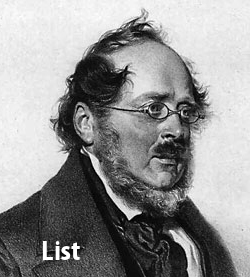 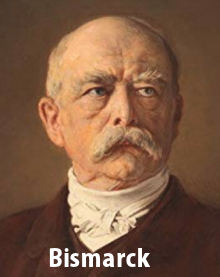
B. Otto von Bismarck -
Pragmatic and conservative leader who served as Chancellor of
the North German Federation from 1867-1871 and as the first
Chancellor of the German Empire that he united from 1971 to
1890. He gained support from industrial leaders with
protective tariffs and outflanked his socialist adversaries by
adopting the world's first comprehensive social welfare
system.
The Sickness Bill of 1883 and the Accident Bill of 1884
protected workers from loss of income, finance from funds
supported by employers and employees. The government verified
workers’ enrollment by comparing employer records with fund
membership lists, threatening employers of uninsured workers
with fines. An old-age program, adopted in 1889, provided
retirement and disability benefits as well.
C. Weimar Republic - After
Germany's defeat in World War I, Kaiser Wilhelm II abdicated,
ending German imperial rule, and a new democratic governmental
system, led by an elected President and parliament (Reichstag)
was adopted at a 1919 meeting in Weimar. Unfortunately, this
system was plagued by political divisions, labor unrest, and
heavy reparations payments, leading to hyperinflation of about
41% per day in 1923. In November 1923, the exchange rate was
4.2 trillion marks per U.S.$. That instability provided
an opening for the rise of Hitler.
D.
Nazis - Private property
and totalitarian control. Centrally planned economy.
Inflationary monetary policies, together with wage/price
controls, created shortages and required severe rationing.
Encouraged cartels. Labor unions subordinated to German
Labor Front.
E.
The Social Market Economy
Based on the economic philosophy of Ordoliberalism from the
Freiburg School. First implemented by Ludwig Erhard, Minister
of Economics from 1949 to 1963.
1.
Market
system would coordinate economy; planning and fine tuning
ruled out.
2.
Monetarist
program adopted for price stability and supply side investment
incentives were used to encourage growth.
3.
Cartel
laws to prevent monopolistic practices and preserve
competition.
4.
Social
welfare programs adopted in the tradition of Bismarck.
UPDATE:
Article
3 of the Treaty on European Union, activated in 2009,
says that the whole EU will "establish an internal market. It
shall work for the sustainable development of Europe based on
balanced economic growth and price stability, a highly
competitive social market
economy, aiming at full employment and social
progress, and a high level of protection and improvement of
the quality of the environment."
UPDATE,
An August
2019 evaluation of 70 years of experience with the
social market economy by the German firm, KfW Research,
reached this general conclusion: "Since the introduction of
the social market economy, the economic and social policies of
the federal and state governments have combined productive
competition with social balance in an exemplary manner in many
respects."
F.
German Government
1. Leadership
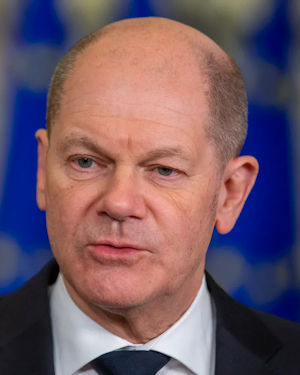 Chancellor - The head of government,
elected by the Bundestag on the proposal of the federal
President. Since December 2021, this has been Olaf Scholz
from the Social Democratic Party (SPD), succeeding Angela
Merkel, from the more conservative Christian Democratic
Union (CDU) who was the first woman to hold the job and ruled
for about 16 years. When he was young, Scholz was an avowed
Marxist who wrote about "overcoming the capitalist economy"
and criticized the "aggressive-imperialist NATO." Now he is
considered to be a member of the centrist wing of the SPD, and
is working with NATO in the Ukraine war. Chancellor - The head of government,
elected by the Bundestag on the proposal of the federal
President. Since December 2021, this has been Olaf Scholz
from the Social Democratic Party (SPD), succeeding Angela
Merkel, from the more conservative Christian Democratic
Union (CDU) who was the first woman to hold the job and ruled
for about 16 years. When he was young, Scholz was an avowed
Marxist who wrote about "overcoming the capitalist economy"
and criticized the "aggressive-imperialist NATO." Now he is
considered to be a member of the centrist wing of the SPD, and
is working with NATO in the Ukraine war.
President - Head of State. Technically, higher-ranking
than the Chancellor, but the role has been more ceremonial in
recent years. However, the current occupant, Frank-Walter
Steinmeier,(also a member of the SPD) provoked
controversy in early 2021 when he endorsed completing a
Nordstream 2 gas pipeline between Germany and Russia. That
project, of course, was suspended after the Russian invasion,
and the Nordstream pipelines were mysteriously sabotaged in
September 2022.
2.
Parliament
Bundestag
- Alternately called the parliament or its "lower" body, made
up of representatives of parties.
Bundesrat - The Federal Council, with representatives
of the Lander (states). Similar to an upper house of
parliament.
3.
Political Parties
Social
Democratic Party (SPD)
- The
center left party that now rules Germany as the senior
partner in a coalition with the Greens and the Free
Democratic Party (FDP). It has also ruled many times in
the past, most recently when Gerhard Schröder was
Chancellor from 1998-2005.
Green
(GRÜNE)
- Environmentalist and pro-European party that has risen
enormously in elections and polls.
Free
Democratic Party (FDP) - Founded in 1948, was a junior
partner in coalition governments during most of the second
half of the 20th century. Generally considered a centrist or
center-right party that supports free markets and
privatization.
Christian
Democratic Union (CDU) and Christian Social Union
(CSU) - These center-right parties were the senior
partners in a "grand coalition" with the SPD for about 8
years, but lost support, partly because Angela Merkel was no
longer on the ballot and partly because of the slow vaccine
roll-out and immigration issues, leading to their defeat in
the September 2021 elections. Helmut Kohl, who led during the
reunification of Germany in 1989, was a CDU member.
Alternative
for Germany (Alternative für Deutschland - AfD) -
Right-wing anti-immigrant populist. Its extremist
wing, "Der Fluegel" (The Wing) has been under
investigation as a threat to society, and the party has
performed poorly in recent polls.
F.
Unification
1. Beginning
November
1989 - Opening of the Berlin Wall
March 1990 - New E. German govt. creates Treuhandanstalt
May 1990 - West established "Fund for Germany Unity"
June 1990 - West controls Treuhandanstalt, prices released
July 1990 - Monetary system unified
October 1990 - Political union
2.
Monetary Union.
a.
Immediate
or flexible rate transition? Dramatic leap chosen to stop
massive immigration from East to West.
b.
What
rate(s) of exchange? Maintain Eastern competitiveness, or
asset values? Choice: range of rates from 1:1 on salaries and
pensions to 3:1 on claims of individuals living outside
Eastern Germany - average effective rate of about 1.8:1.
c.
Wages
in nationalized sector? W. German unions insisted on quick
equalization. In the larger firms that engage in
collective bargaining, wages in the East are now about 97% of
those in the West. Along with privatization, the wage policy
led to enormous transitional unemployment.
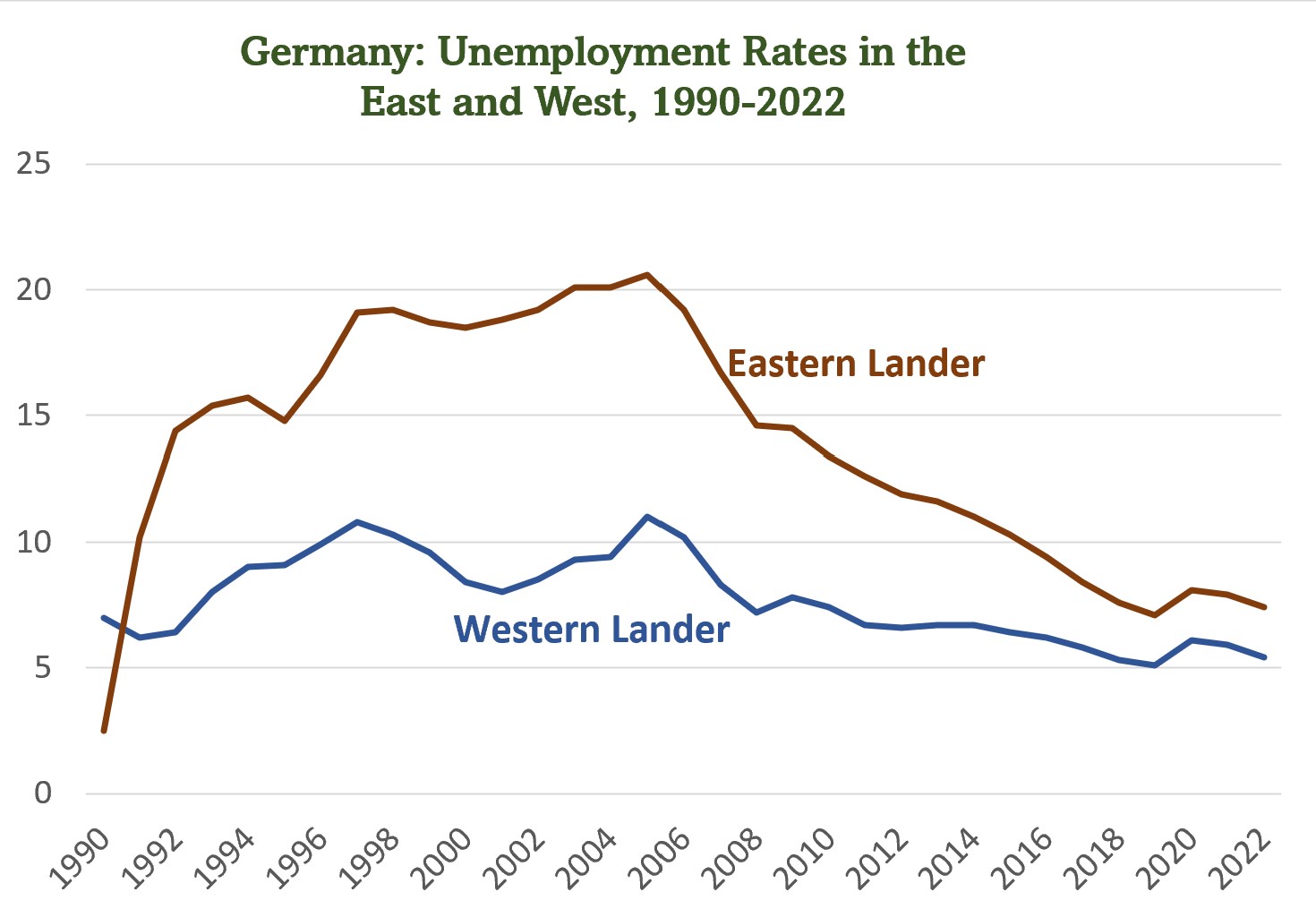
3.
Privatization
a.
Wolfgang
Ullman, East German theologian and agitator, called for
holding company to take possession of state property, and gradually
redistribute to E. Germans with vouchers.
b.
Instead,
Treuhand fell under control of West, initially attempted
restitution,
then
rapid
sales to
strategic investors.
This system was quick, attracted capital and skill, but not
transparent.
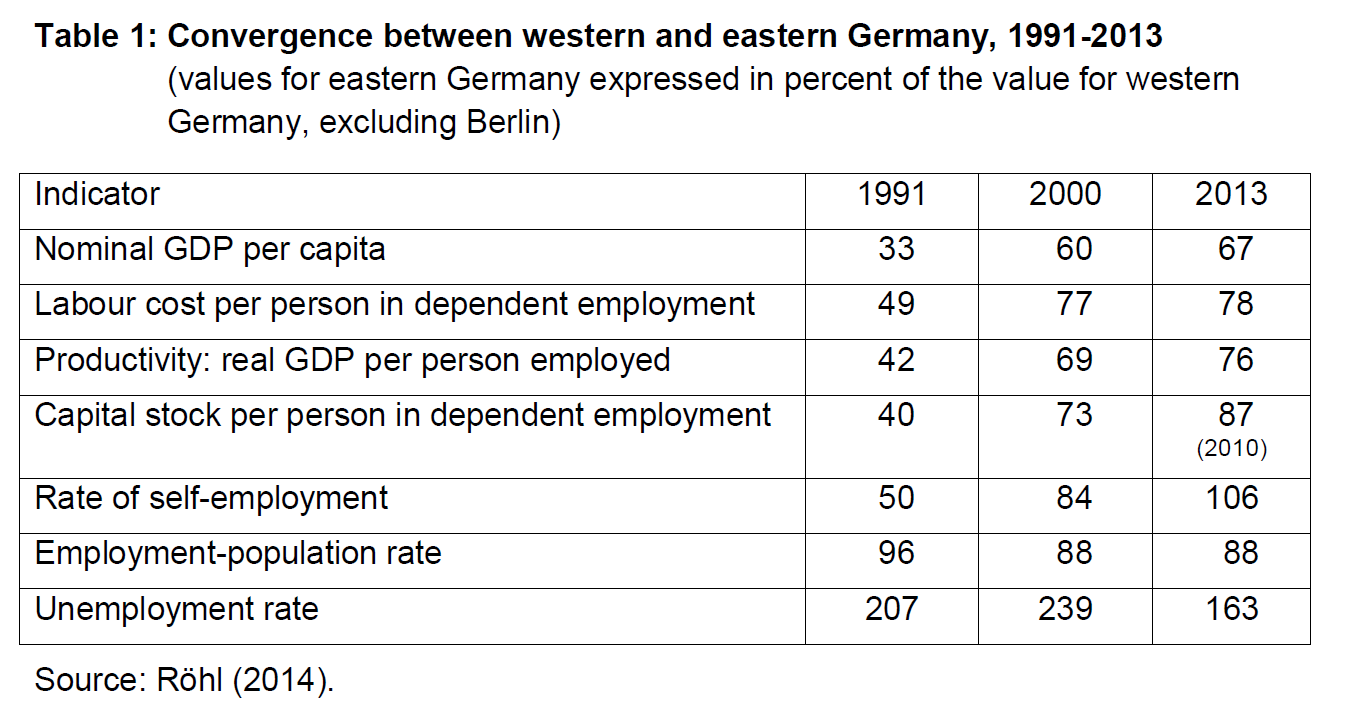
II.
Industrial Organization
A.
Cartels - Supported by
Bismarck & Hitler to control world markets.; control
prices and market conditions. After World War II a
movement started to dissolve the cartels. Still rarely
allowed to promote exports, to ease the adjustment problems of
dying industries, or to reduce research and development costs.
The Act against Restraints of Competition (ARC), the main law
prohibiting cartels and other anti-competitive practices,
underwent important
changes in January 2021 with new rules to protect
competition in the digital economy and streamlined procedures
for collection of evidence.
B.
Lack of entrepreneurs -
Workers and investors favor stable industries, traditionally
dislike "gambling."
III.
The Labor Market & Labor Relations
A.
Collective Bargaining -
Only 18 percent of the labor force unionized, but 60% of
employees in Western Germany and 47% in Eastern Germany are
covered by collective agreements. Closed shop is
illegal. Unions represent large groups of workers in broad
industrial groups; are generally moderate.
B.
Codetermination –
1.
Works Councils—All
firms with 5 or more workers are required to allow them, but
they are created at worker initiative. So they exist only in
10% of firms, but they are the larger ones, so they cover
about 40% of workers. They represent labor on most nonwage
issues, such as work-place safety, employment security,
the organization of working time, rules on internet use and
working from home. Evidence suggests that workers in firms
with works councils are more productive, and their employers
are more likely to provide profit sharing and performance pay
and to protect employee health.
2.
Supervisory Boards—provide
overall guidance to the company and appoint the management
board that handles day-to-day decisions. Labor representatives
hold 1/3 of positions in firms with over 500 employees and 1/2
positions in firms with over 2,000. Little labor influence on
general corporate policy. Labor reps concerned with
continued prosperity of the company.
3.
Supporters:
codetermination has maintained peaceful labor relations.
Critics: it threatens private property.
UPDATE
, During 2002-2005, seeking a solution to the high
unemployment rates that followed unification, a Commission led
by Peter Hartz, the Personnel Director of Volkswagen,
developed five waves of labor market reforms. These
included:
- The
creation of Personal Service Agencies (PSAs) to act as
agencies to place unemployed people with employers (Hartz
I);
- A
grant for entrepreneurs, known as the “Ich-AG” (Me, Inc.),
to encourage new businesses (Hartz II);
- The
creation of part-time job opportunities with a low threshold
and minimum salary, “Mini-jobs” and “Midi-jobs” (Hartz II);
-
Restructuring the Federal Employment Agency and creation of
job centres for more effectively assisting the jobless with
their job searches (Hartz III);
-
Benefit cuts of up to 30 percent if a person on unemployment
benefits refused to take up a reasonable offer of work
(Hartz IV); and
- The
merger of social welfare benefits with long-term
unemployment benefits (Hartz IV).
The
good news is that German unemployment fell substantially with
the reforms, and Germany continued to grow as an exporting
powerhouse (although now it's being hit especially hard by the
COVID-19 Crisis. The bad
news is that wages have stagnated at relatively low
levels and a large segment of the public hates the reforms.
C.
Apprenticeships - These
date back to 1897, but operate under a law passed in 1969 that
regulates the vocational training system with shared
responsibility of the national and state governments, the
unions, associations and the chambers of trade and industry.
Required for hundreds of jobs (with 342 recognized), it
involves 2/3 of mid-school grads. Lasts 2-3 years, some work
on-the-job and some in training centers, ending with national
exam. Years later, another exam to become "meister."
Financed by industry/government. Curriculum developed by
industry, unions, and educators. 50-80 percent of apprentices
stay with training companies; low teenage unemployment.
D.
Guest workers -
Recruited for low-skill positions during labor shortage of
1960s. Play vital role in sanitation, construction,
hospitals, etc. When unemployment rose in 1973, ban
imposed on further recruitment. In 1983, Parliament
offered prepaid social benefits to workers who returned home.
Flood of immigrants and return of Germans after communist
collapse led to violence, caused government to tighten
restrictions. Today, based on its earlier experience with
guest workers, Germany is attempting to integrate the new wave
migrants from Syria and elsewhere more effectively into
society.
IV.
The Governmental Sector
A.
Fiscal Policy and Planning
- Initially after World War II, rejected Keynesianism and
established supply-side fiscal policy. Later, more use
of stabilization, but returned to a supply-side policy in
1982. Kohl administration has tried unsuccessfully to
reduce the governmental share of GNP and cut taxes.
Presently, trying to cut some governmental and company-based
social benefits.
B.
Monetary Policy – Before
the adoption of the Euro, the Bundesbank maintained a strong
monetarist stance. Germany had the strongest
anti-inflation record of all Western industrial nations.
C.
Military Expenditures –
Traditionally, since WWII, has kept a low level of
expenditures compared to other major world powers. However,
soon after the Russian invasion of Ukraine, Chancellor Scholz
called it “a turning point in the history of our continent”
and said the German military would receive a one-off
additional payment of over $110 billion — about twice
Germany’s defense budget for the previous year, and he
committed to exceeding the NATO defense spending target of 2
percent of GDP “from now on, every year.”
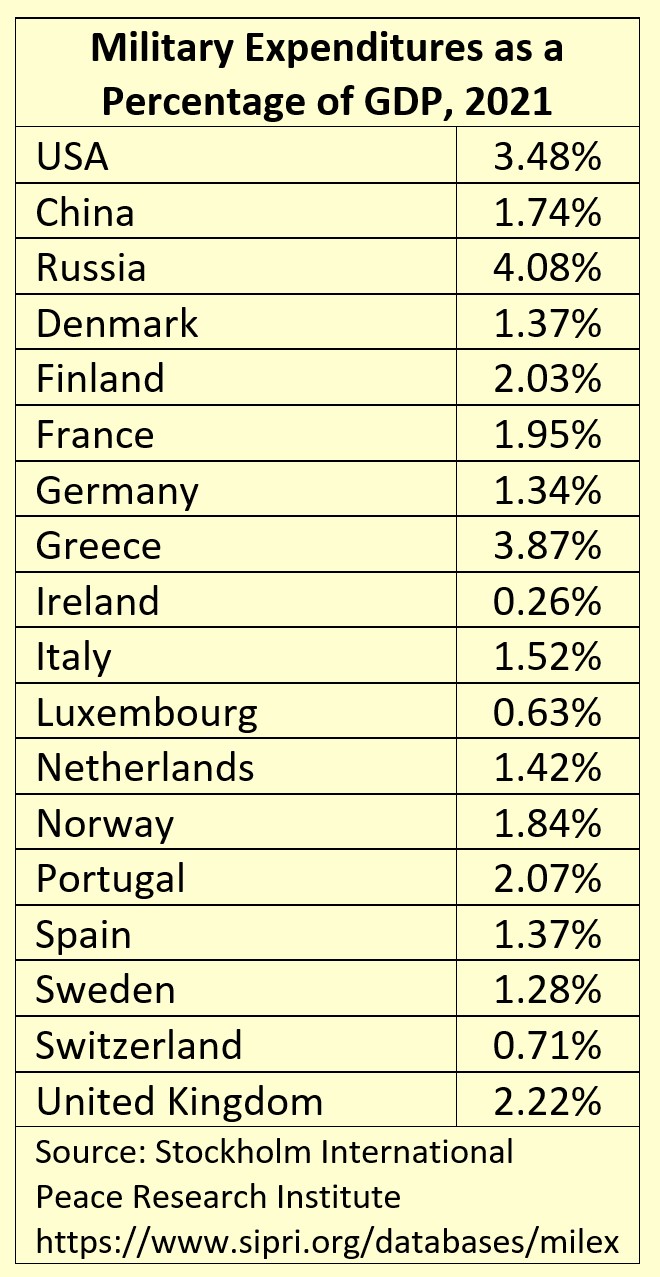
D.
Redistribution
of Income
- Under Bismarck, programs established for insurance against
sickness, accidents, elderly and disabled, and for widows and
orphans. Unemployment insurance adopted after World War
I. After World War II, system of social welfare
programs. Today, includes maternity grants, "child care
vacations" for new mothers, family allowances for families
with school age children, free university educations for
many. According to recent
research by Judith Niehues:
(1) Germany has achieved a relatively high level of income
equality through redistribution (confirmed by our study of
data in Chapter 2)
(2) Survey data indicate that the desire for equality is above
the rich-country average
(3) Surveys suggest that the population does not support
additional spending on redistribution, but they underestimate
how progressive the tax system is already, so they support
more progressive taxes.
OECD Redistribution
(vertical) and Redistribution Preference (horizontal)
|